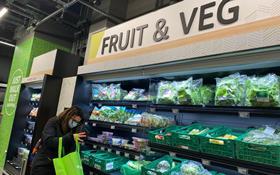
Amazon is to overtake Tesco as the UK’s largest retailer within the next four years, with UK sales expected to reach £77.1 billion by 2025, reveals a report from Edge by Ascential’s syndicated research arm, Edge Retail Insight.
In 2020, Amazon UK’s total sales were £36.3 billion. Tesco’s sales were almost double at £64 billion.
By 2025, Edge predicts that Tesco sales will rise to £76.1 billion, representing CAGR growth of 3.5%. These numbers represent total sales. In the edible grocery category, Amazon still represents a relatively small player in the UK, despite growth of 17.6% in 2020 at the height of the pandemic when health concerns saw more people buying essentials online, many for the first time.
The United Kingdom retail landscape and go-to-market planning report, based on forecasts powered by Edge’s proprietary data analytics technology, suggests that Sainsbury's will hold on to its position as the UK’s third largest retailer, with CAGR sales growing by 4.5% to reach £42.2 billion by 2025. CAGR sales at Asda, which has recently been purchased from Walmart by the British owners of the EG Group, are expected to grow by 2.4% to £26.7 billion by 2025 to come in at fourth place by 2025.
The report analyses the performance of chain retailers and channels performance in the UK as of March and explores unique market characteristics to determine where suppliers should focus their investment to win in the market.
Both Tesco and Sainsbury’s recently reported bumper food and online sales in their full 2020-2021 financial year results, but costs related to the COVID-19 and adding to fulfilment capacity to meet a steep incline in demand, cut into earnings for both retailers. But both firms said they expected profit to bounce back next year, with the focus firmly on their online operations.
Edge by Ascential’s data forecasts Sainsbury’s Argos to be the fastest-growing leading player over the next five years, expanding at a 2020-2025 CAGR of 17.3%.
Data from Edge reveals that a third (33.4%) of all UK chain retail sales is expected to occur online by 2025, up from 26% in 2020, outperforming all physical channels by a stretch. Ecommerce sales will grow from £105.2 billion in 2020 to £176.2 billion by 2025.
The only other channel to grow market share over the next few years will be the discounters, which will account for 8.2% of UK chain retail share by 2020, up from 7.9%. All other channels, including supermarkets, will lose market share by 2025. Food service will remain static.
Edge analysts also highlight the rapid growth of ecommerce in UK grocery retail, with online penetration rising from 8.2% to 10.9% by 2025. Leading retailers are adapting to the shift in consumer spending patterns at pace, innovating in last-mile delivery with delivery intermediary partnerships and investing in automation in warehouses.
Deren Baker, CEO at Edge by Ascential, said: “The UK is one of the largest retail markets in Europe, and a key market for many brands around the world. Our data shows that ecommerce is expected to grow in the UK over the next few years, and this will be driven by digital marketplace giants like Amazon, and omnichannel marketplace giants like Tesco.
“Over the past year, Amazon has grown its online retail footprint in the UK and expanded into the high street, with the launch of three Amazon Fresh shops in London and a high-tech hair salon, where it can trial technology and product innovation and increase brand presence in the fast-growing beauty sector. “
Commenting on the rise of online grocery, Robert Gregory, Advisory Research Director, Edge by Ascential, said: “The past year has seen online grocery accelerate in the UK, a market which already had one of the world’s highest penetration rates for online grocery. While Amazon has seen sales grow strongly, so have the larger grocers, with the likes of Tesco, Sainsbury’s and Asda all being able to expand capacity for their online services. Tesco recently revealed a 77% increase in online sales during its 2020-21 full year results after doubling its online capacity to 1.5 million slots a week.
“Growth will also be driven by leading players looking to improve delivery speed, including partnerships with last-mile delivery specialists such as Deliveroo and Uber Eats.
Baker said: “Physical stores will remain an important channel but consumer packaged goods (CPG) brands must prioritise their online strategies to capture growth opportunities, particularly in mature digital markets, like the UK.
“That means understanding how to convert shoppers online through digital touchpoints, such as marketplaces like Amazon, where many now begin their purchase journeys. The next five years will be defined by the ability of CPG firms to leverage the might and skill of marketplaces to acquire customers. This is next-generation retail - Retail 5.0 - marketplaces mastering personalisation at scale. CPG brands must focus investment on winning market share through the online platforms most relevant to them.”



